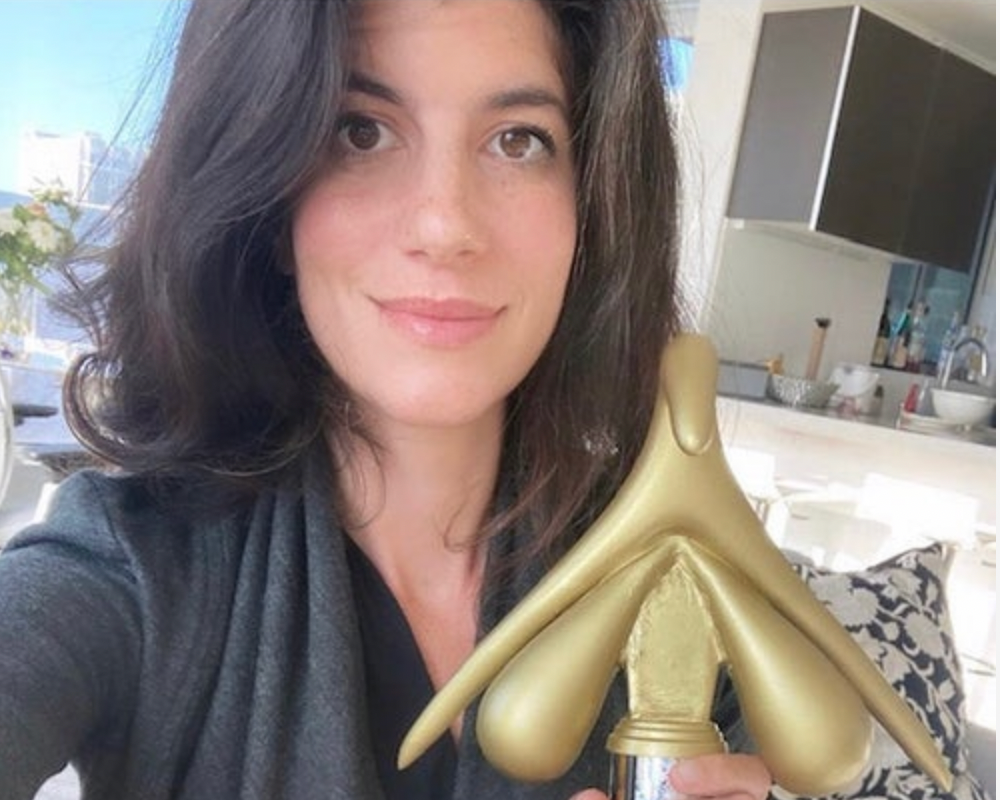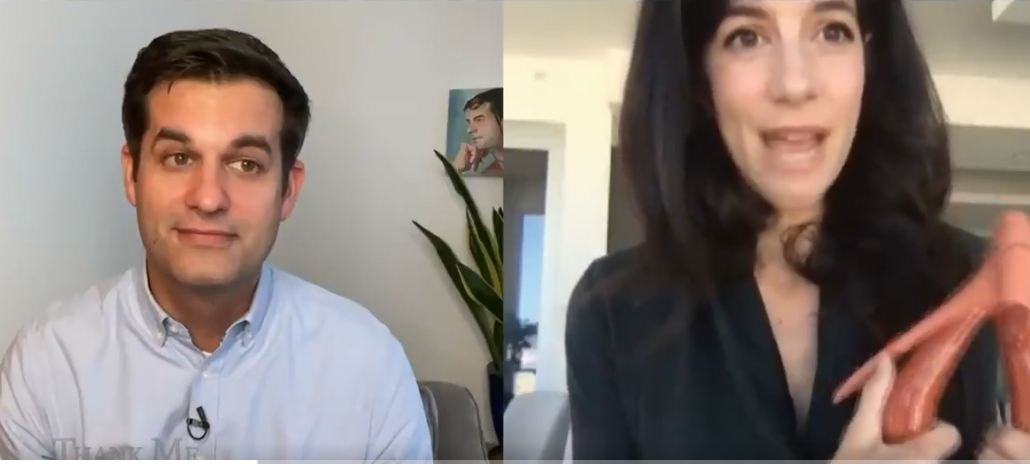One woman’s campaign to convince the world to embrace the clitoris
Jessica Pin lost genital sensation after a labiaplasty – and began a campaign to educate doctors and patients, writes Sheila Flynn

Your support helps us to tell the story
From reproductive rights to climate change to Big Tech, The Independent is on the ground when the story is developing. Whether it's investigating the financials of Elon Musk's pro-Trump PAC or producing our latest documentary, 'The A Word', which shines a light on the American women fighting for reproductive rights, we know how important it is to parse out the facts from the messaging.
At such a critical moment in US history, we need reporters on the ground. Your donation allows us to keep sending journalists to speak to both sides of the story.
The Independent is trusted by Americans across the entire political spectrum. And unlike many other quality news outlets, we choose not to lock Americans out of our reporting and analysis with paywalls. We believe quality journalism should be available to everyone, paid for by those who can afford it.
Your support makes all the difference.There is nothing about Jessica Pin that would even slightly hint at her status as a medical provocateur.
She’s a deadpan 35-year-old Dallas native with shoulder-length brunette hair. She is not a doctor. Her demeanour is unexcitable and borderline jaded, yet her tireless efforts have helped her begin to revolutionise the understanding of women’s sexuality – and, particularly, the understudied anatomy of the clitoris.
It’s not a body part regularly discussed; still a victim of shame, embarrassment and, to some extent, even medical indifference. But after a cosmetic surgery when Ms Pin was a teenager that she says left her with scarring and reduced her clitoral and labial sensitivity, the daughter of a plastic surgeon has dedicated herself to educating the public and the medical community about the female equivalent to the penis – which, according to her, gets about 50 pages more than the clitoris in much medical literature.
It’s a topic that saw Ms Pin appear on The Daily Show on Wednesday, when she told Michael Kosta about her work. She later said that her “favourite” part of the recording had been left out.
Writing on Instagram, she said: “Here was just one part I wish got included, as it was my favorite from the recorded interview, and that was when I explained why I do what I do. “I said, ‘If I can stop harm from happening to other women now and in the future, that feels like justice for myself, as it is an affirmation that what happened to me never should have happened and is not okay.’“In reply, Kosta said, “I like that. That’s empowering, and I’m pretty sure that’s what Batman says. So basically you’re a superhero, except your cause is more important.”
Speaking to The Independent about her work, Ms Pin said: “There is a correlation between stigma around female external genitals and stigma around sexuality in general.
“I think a lot of this comes from ideas that women are supposed to be reproductive and not sexual. That’s why we define women’s genitals in terms of the birth canal and what gives men pleasure instead of what gives women pleasure. There’s a pattern there that I think is very significant.”
She only realised the disparity – and the dearth of clitoral anatomical knowledge – after the 2005 labiaplasty that left her with less feeling in her genitals. Labiaplasty is a surgery to reduce the the size of the labia minora – the external skin surrounding the vaginal opening.
The disastrous results of Ms Pin’s procedure prompted her to dedicate her life to a campaign that saw her not only dissecting the genitals of female cadavers with her father but successfully convincing a handful of medical textbooks to change their content.
Around the same time, a young OBGYN was noticing the same disparity that raised Ms Pin’s hackles.
“In medical school, we didn’t learning anything about the clitoris,” Dr Tami Rowen, an associate professor of obstetrics, gynecology and reproductive science at University of California San Francisco – which has one of the best OBGYN programmes in the United States – told The Independent.
“There was almost no teaching on it – and we did learn about the penis and penile tissue. I always maybe had the assumption in my mind that the clitoris was analogous or homologous,” the now 39-year-old said, adding that “there was a definite disparity”.
“That’s just male sexuality, in general,” Dr Rowen said, continuing: “I go to these conferences and my mind explodes every year at the degree of research and scholarship and literature and treatment and everything related to male sexuality compared to female sexuality. Oh my God – it’s night and day.
“I used to think this didn’t have anything to do with misogyny, and I no longer feel that way. There is an assumption, because the act of penetrative sex requires an erection ... there is such a focus on erection.”

She added: “I think that’s part of why there hasn’t been as much focus, because there isn’t as much physiology required to engage in the act of sex and because of that [many professionals have] ignored the fact that pleasure is a huge part of this. That’s not what people are paying attention to. They’re paying attention to whether people actually engage in it ... the clitoris isn’t required to have intercourse.”
Dr Rowen is familiar with the advocacy of Ms Pin and commends her, pointing out that recently, for routine upskilling material, she and other doctors were required to read an article about clitoral anatomy – for the first time in her career.
That may not have directly been a result of Ms Pin’s work, but Dr Rowen believes the campaigner and shifting attitudes are making inroads to equalising health care and knowledge between different sexes.
“Over the years, I’ve realised how extraordinarily important it is to women and we’ve missed the ball,” Dr Rowen said of the medical knowledge surrounding the clitoris and related anatomy.
The fact also can’t be ignored that, for most of history, medical texts were almost exclusively written by men. The tide has been turning in recent years, but not quickly.
What is the clitoris and, more importantly, WHERE is it?@michaelkosta learns something surprising. pic.twitter.com/stqUQG010u
— The Daily Show (@TheDailyShow) October 9, 2021
“I think it is going to change. I think more women are going into medicine. I think OBGYN is going to be more talked about,” Dr Rowen told The Independent.
“I think part of the reason people don’t talk about it is because they don’t know” enough about the region or how to treat conditions, she said.
“You don’t talk about things you don’t know how to treat,” she said. “If we get more treatments ... they’ll talk about it more.”
Ms Pin is certainly at the forefront of lobbying the medical community about more open discussion and research on the clitoris and labia. She’s been educating herself on the topic for nearly 20 years, when she decided as a 17-year-old virgin that she needed a labiaplasty.
Her backstory is a bit unusual. The teenager, not having the knowledge or words to understand her own body, began looking into female genitalia online. Then she began comparing herself to pictures and worrying that she didn’t fit the ideal mold. So she lied and told her parents that her labia – which she now realises fell into a completely normal range – were causing her pain and needed to be operated on. Despite her young age, everyone agreed.
“My labia minora were completely amputated and my clitoral reduction was done without my consent and I lost clitoral sensation,” said Ms Pin, insisting that the risks of the procedure and loss of sexual function were never outlined for her. She says the consent forms didn’t detail those possibilities, either.
She added: “I literally have no sensation at all in the glans of my clitoris, and that’s not normal ... Basically, my doctor performed a clitoral hood reduction without my consent and severed the dorsal nerves of my clitoris.
“At the time, I still did not understand what a clitoris was,” she told The Independent.
That would quickly change when she realised that she’d lost those sensations and delved into her mission to educate doctors and the public about the little-understood female sexual organ. She conducted research and interviews into the anatomy and nerve structure, hoping to include in medical teaching materials the same diagrams and information usually dedicated to male genitalia.
She enlisted the help of her surgeon father to do their own anatomical explorations, dissecting the clitoris on each of 10 cadavers and taking measurements. They concluded the organ is larger and more complicated than most realise, and she set about trying to get that information on the medical record.
“The point of getting cross-sections into medical literature is to show how superficial [nerves] are under the skin to the clitoral hood,” she said.
While Ms Pin’s name was not on the article included as required reading for doctors, Dr Rowen said, she thinks her work “probably has laid the groundwork for this”.
The issue of getting more attention paid to the clitoris and female anatomy, Dr Rowen said, is multi-faceted. As usual, much of it comes down to money; there’s far more demand for drugs addressing male sexual function, so that’s where the research funding goes. On top of that, she said, it’s cultural.
There are “studies that have looked at hundreds of women; they measure their labia majora and labia minora,” she told The Independent. “What they found is that the average, most common appearance of the vulva is not what is depicted in current pornography, for example, or current images.”
She said that, on a regular basis, she sees the same insecurities in patients that made Ms Pin seek out a labiaplasty that changed the course of her life.
“There’s not one single day that somebody doesn’t apologise to me for their body appearance,” Dr Rowen told The Independent. “It’s either they’re not groomed, their socks smell funny, their legs are unshaved, or people are self-conscious about what their vulvas look like.
“It’s horrible. It’s heartbreaking.”
That’s what Ms Pin is committed to turning around – lack of knowledge and misinformation-prompted body dysmorphia.
Her profile on Instagram – where she regularly shares diagrams, data and information – sums up her mission, reading: “Goal: equitable coverage of the clitoris in medical literature & curricula to prevent harm.”
This article was amended on 7 December 2021, to replace the statement that Ms Pin has ‘no professional scientific training’, with ‘she is not a doctor’. Ms Pin has a bachelor’s degree in biomedical engineering.



Join our commenting forum
Join thought-provoking conversations, follow other Independent readers and see their replies
Comments